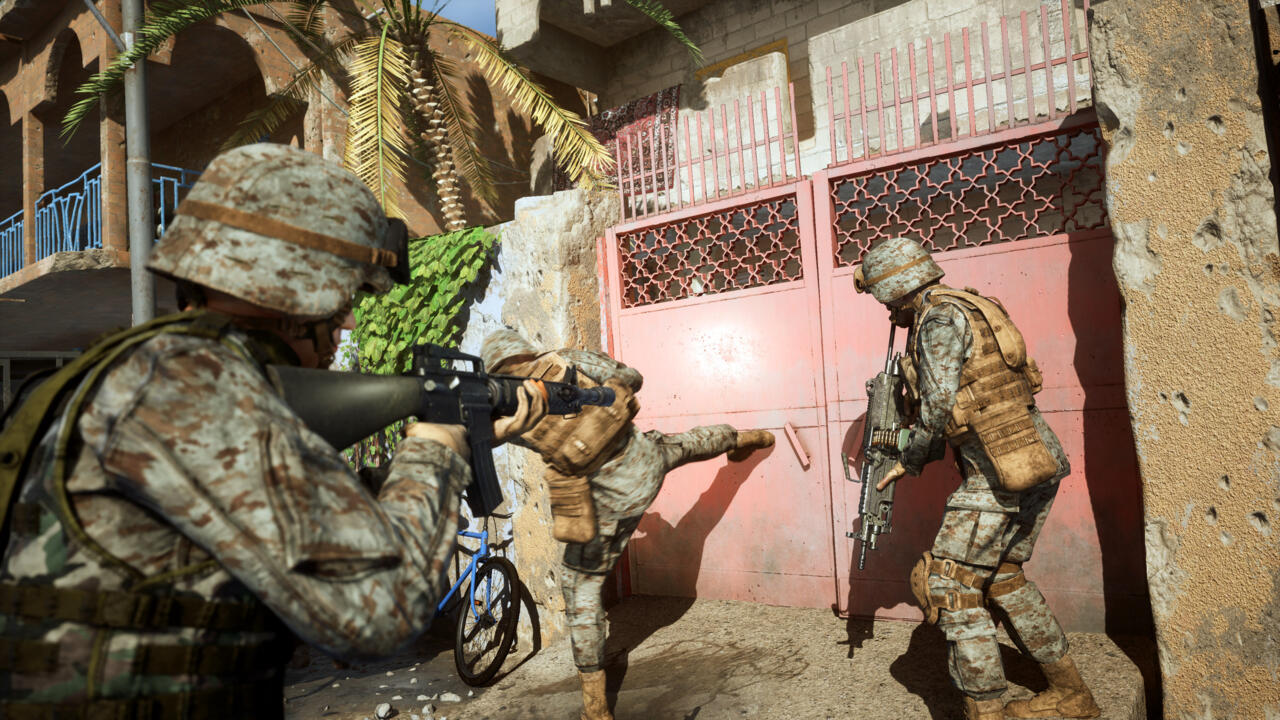Six Days In Fallujah Publisher Says The Game Is "Inseparable From Politics"
26 Iraqi civilians and dozens of soldiers shared their insight to help make the new version of Six Days in Fallujah.
The publisher of Six Days in Fallujah has released a statement regarding the game's take on its political content and more. Posted to the Twitter account of publisher Victura, the statement begins by acknowledging that Six Days in Fallujah is "inseparable from politics" because it depicts real-world events that happened during the conflict.
This statement comes after Victura boss Peter Tamte said in an interview that Six Days in Fallujah is "not trying to make a political commentary" about the conflict.
The new statement also addresses the criticism that Six Days in Fallujah does not contain enough representation from a diverse set of voices and viewpoints.
"The stories in Six Days in Fallujah are told through gameplay and documentary footage featuring service members and civilians with diverse experiences and opinions about the Iraq War," it says. "So far, 26 Iraqi civilians and dozens of service members have shared the most difficult moments of their lives with us, so we can share them with you, in their words."
The documentary segments of Six Days in Fallujah will touch on "many tough topics," the statement says, including the "events and political decisions that led to the Fallujah battles as well as their aftermath."
The statement confirms that Six Days in Fallujah will not feature the controversial chemical agent white phosphorous as a weapon during gameplay, but it will be discussed in the documentary segments. Activision's top-selling Call of Duty: Modern Warfare features white phosphorous as a killstreak, while Black Ops Cold War has a napalm strike killstreak perk.
The Victura statement goes on to explain how some of Six Days in Fallujah's campaign missions will play out. Players will get context through the documentary segments and then embark on the missions themselves where they must "solve real military and civilian scenarios."
This all happens interactively, the statement says. This is notable because Six Days in Fallujah offers a "perspective into urban warfare not possible through other media," Victura said.
"We believe the stories of this generation's sacrifices deserve to be told by the Marines, soldiers, and civilians who were there. We trust you will find the game--like the events it recreates--to be complex," the statement said.
Six Days in Fallujah tells the story of the Second Battle of Fallujah, which took place between November and December 2004, at the height of the Iraq War. According to the humanitarian group the International Red Cross, as many as 800 civilian lives were lost by inhumane means, such as using the chemical white phosphorous as a weapon by the US.
Tamte said in the earlier interview that he is working so hard to release Six Days in Fallujah to honor the soldiers who died.
"A message that I heard from all of the people who've lost loved ones in battle is, they don't want their child or friend's sacrifice to be forgotten," Tamte said. "Even the ones who were very opposed [to the war in Iraq]. And I had conversations with many of them, as well as other members of our team--especially former military who are on our team [that] had conversations with many of these families in 2009--and we heard one after the other, 'We don’t want you to make a game about this, but we don't want our son's sacrifice to be forgotten.' It's a mixture of that. The reality is that most people are not aware of the battle for Fallujah."
Six Days in Fallujah was originally set to be published by Konami about a decade ago before the publisher pulled out of its deal with Tamte and the studio Atomic Games. Tamte kept working on the game in the background and he's now partnered with Highwire Games, the studio founded by Destiny and Halo veterans, to work on the new edition of Six Days in Fallujah. The game is slated to release in 2021 on console and PC.

British anti-war group Stop the War Coalition told media in April 2009 that making a video game based on war is reprehensible.
"To make a game out of a war crime and to capitalise on the death and injury of thousands is sick," the group said. "There will never be a time when it is appropriate for people to 'play' at committing atrocities. The massacre in Fallujah should be remembered with shame and horror, not glamorized and glossed over for entertainment."
In 2019, Dakota Meyer, the former United States Marine who was awarded the Medal of Honor for saving lives and sustaining injuries in a 2009 military operation in Afghanistan, spoke up about how war video games "romanticize" war in an unhealthy way.
"War has now been romanticized. It's been romanticized that it's this cool image ... I hear people say I just want to go kick in doors and shoot people in the face. Well, you've probably never done it then. We've got kids playing video games of the stuff that keeps me awake at night. And it's like, at what point do we start humanizing these things?" Meyer said.
Former Marine sergeant Eddie Garcia, who served in the war and was wounded during battle, originally pitched the idea for Six Days in Fallujah in 2005. He said in a statement, "War is filled with uncertainty and tough choices that can't be understood by watching someone on a TV or movie screen make these choices for you. Video games can help all of us understand real-world events in ways other media can't."
Got a news tip or want to contact us directly? Email news@gamespot.com





